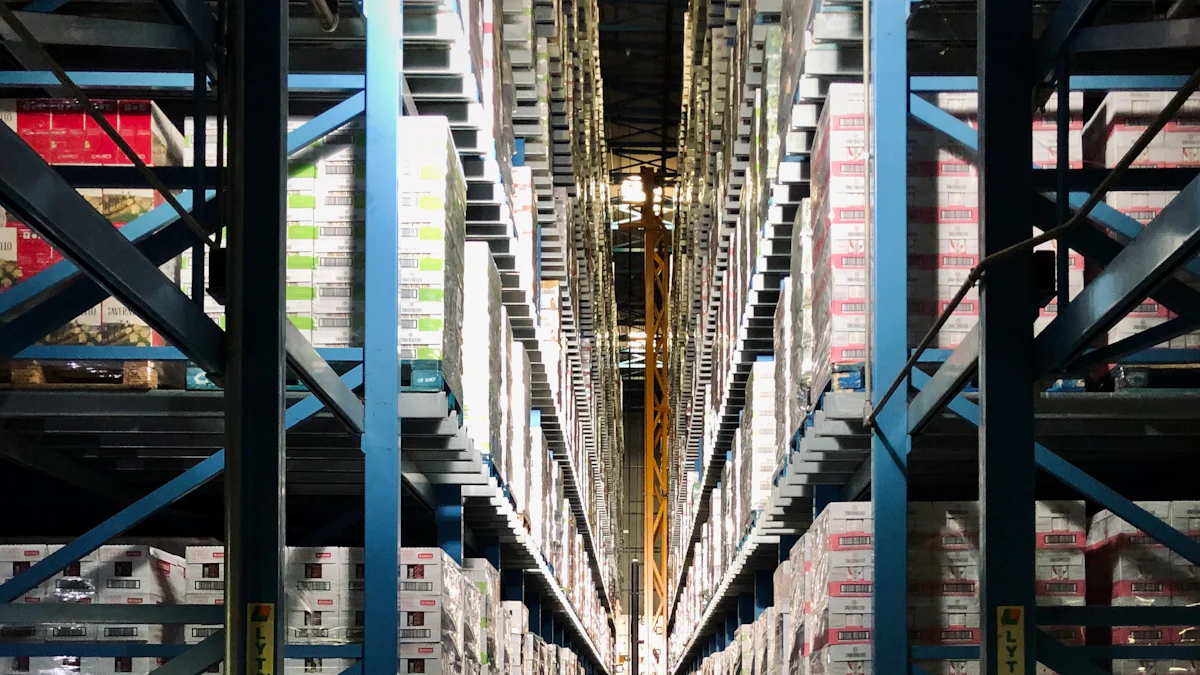Is Your Supply Chain Ready for the Digital Leap? Find Out Now!

Supply chain digitalization is no longer just a buzzword; it's a critical strategy for businesses striving to stay competitive in today's fast-paced market. The urgency and importance of digital transformation have never been more evident, with 93% of companies actively engaged in the process. This blog will delve into the key aspects of supply chain digitalization, from enhancing efficiency to ensuring resilience, providing you with actionable insights to propel your business forward.
The Importance of Supply Chain Digitalization

Enhancing Efficiency is a crucial aspect of supply chain digitalization. By Streamlining Operations, businesses can optimize their processes and eliminate unnecessary steps that hinder productivity. This leads to Reducing Costs as streamlined operations are more cost-effective and efficient.
Improving Decision-Making is another key benefit of supply chain digitalization. Leveraging Data Analytics allows companies to make informed decisions based on data-driven insights. Real-Time Insights further enhance decision-making by providing up-to-date information for quick and effective actions.
Ensuring Resilience is essential for businesses to navigate challenges effectively. With Crisis Management strategies in place, companies can respond promptly to unexpected events and minimize disruptions. Adaptability is equally important as it enables businesses to adjust their operations swiftly in response to changing market conditions.
Digitalization Impact on Supply Chain Performance
Improving supply chain performance at minimal cost
Demonstrates the benefits of digitalizing supply chains
Key Trends in Supply Chain Digitalization

Advanced Analytics
In the realm of supply chain digitalization, Advanced Analytics plays a pivotal role in revolutionizing traditional supply chain practices. By harnessing the power of data, companies can gain valuable insights into their operations, enabling them to make proactive decisions that drive efficiency and optimize performance. According to Anupam Shrotary, an expert in Digital Supply Chain Technologies, "Investment in digital and driving towards autonomous supply chain is a key priority." This underscores the significance of leveraging advanced analytics to propel businesses forward.
Predictive Analytics
One of the key components of Advanced Analytics is Predictive Analytics, which empowers organizations to forecast future trends and outcomes based on historical data patterns. By identifying potential issues before they arise, companies can proactively address challenges, minimize risks, and enhance overall operational efficiency. Embracing Predictive Analytics allows businesses to stay ahead of the curve and adapt swiftly to changing market dynamics.
Prescriptive Analytics
Complementing Predictive Analytics is Prescriptive Analytics, a cutting-edge technology that not only predicts future scenarios but also provides actionable recommendations to optimize decision-making processes. Through Prescriptive Analytics, companies can streamline their supply chain operations, improve resource allocation, and maximize productivity. By integrating prescriptive insights into their strategies, businesses can achieve greater agility and competitiveness in today's dynamic marketplace.
Another significant trend shaping the landscape of supply chain digitalization is Cloud Computing. This innovative technology offers unparalleled scalability and flexibility for businesses looking to modernize their supply chain processes. As highlighted by industry experts, integrating digital supply chain tools can bring substantial opportunities when applied correctly. The cloud environment fosters seamless collaboration among stakeholders, facilitates real-time information sharing, and enhances overall visibility across the supply chain network.
Scalability
The scalability of Cloud Computing enables companies to adapt quickly to evolving market demands by expanding or reducing resources as needed. This flexibility empowers organizations to respond promptly to fluctuations in consumer preferences, production requirements, or external factors that impact supply chain operations. Leveraging cloud-based solutions ensures that businesses can scale their operations efficiently while maintaining cost-effectiveness and operational excellence.
Collaboration
Collaboration lies at the heart of successful supply chain digitalization, and Cloud Computing serves as a catalyst for fostering collaboration among diverse stakeholders within the supply chain ecosystem. By leveraging cloud-based platforms for communication and data sharing, companies can break down silos, promote transparency, and strengthen partnerships with suppliers, distributors, and other key players. Enhanced collaboration leads to improved coordination, faster decision-making processes, and ultimately drives greater value across the entire supply chain network.
The integration of Artificial Intelligence (AI) into supply chain operations represents a transformative shift towards automation and intelligent decision-making capabilities. With AI technologies such as automation and machine learning gaining prominence in the digital era, businesses are poised to unlock new levels of efficiency and innovation within their supply chains. As emphasized by industry experts like Anupam Shrotary: "Integrating digital technologies can bring substantial opportunities when applied correctly."
Automation
Automation powered by AI revolutionizes traditional manual tasks within the supply chain by streamlining repetitive processes, reducing human error, and enhancing operational speed. From automated order processing to robotic warehouse management systems, AI-driven automation optimizes workflows, increases productivity levels, and ensures consistent performance across various touchpoints in the supply chain network.
Machine Learning
Machine Learning algorithms embedded within AI systems enable predictive modeling capabilities that enhance demand forecasting accuracy, inventory management optimization, and risk mitigation strategies. By analyzing vast datasets in real-time, machine learning algorithms identify patterns, trends, and anomalies that empower businesses to make data-driven decisions with precision and confidence. Embracing machine learning technologies equips organizations with adaptive intelligence that continuously learns from data inputs to refine operational strategies proactively.
Steps to Implement Supply Chain Digitalization
Assessing Current State
To embark on the journey of supply chain digitalization, companies must first Assess their Current State. This involves conducting a comprehensive evaluation of existing processes, technologies, and resources to identify areas that require enhancement. By Identifying Gaps in the current supply chain framework, businesses can pinpoint inefficiencies and bottlenecks that hinder operational performance. Setting clear Goals is crucial at this stage to establish a roadmap for digital transformation and align objectives with the overarching business strategy.
Investing in Technology
Investing in Technology is a pivotal step towards achieving supply chain digitalization goals. Choosing the Right Tools is essential to ensure seamless integration and functionality across various supply chain functions. Cloud-based Supply Chain Integration Solutions offer real-time data exchange capabilities and user-friendly monitoring tools for actionable insights. These solutions accelerate digital transformation by supporting API-based connectivity and legacy application integration.
Integrating Systems is another critical aspect of technology investment in supply chain digitalization. Digital Technologies Transforming Supply Chain Operations play a key role in enhancing efficiency, transparency, and flexibility within supply chains. By leveraging analytics, robotics, artificial intelligence, and IoT technologies, businesses can automate processes, collect data efficiently, and support informed decision-making.
Training and Development
Training and Development are integral components of successful supply chain digitalization initiatives. Employee Training programs equip staff with the necessary skills to leverage digital tools effectively and adapt to new technological advancements. Continuous Learning ensures that employees stay updated on emerging trends and best practices in supply chain management. Advanced Analytics for Digital Supply Chain Management enables organizations to process vast amounts of data intelligently, providing valuable insights into processes, products, and people.
Supply chain digitalization is not just a trend; it's a strategic imperative for businesses looking to thrive in today's competitive landscape. By enhancing efficiency, improving decision-making, and ensuring resilience, companies can unlock a world of opportunities. The benefits are clear - optimized inbound supply chains lead to significant reductions in transportation costs, shipments, and carbon emissions. To succeed in this digital era, businesses must embrace change, invest in the right technologies, and prioritize continuous learning. The future of supply chain management is digital - are you ready to take the leap?
See Also
Discover Your Supply Chain Efficiency Today!
Exploring AI Integration in Future Supply Chains
The Future of Logistics: Tech Advancements Unveiled
